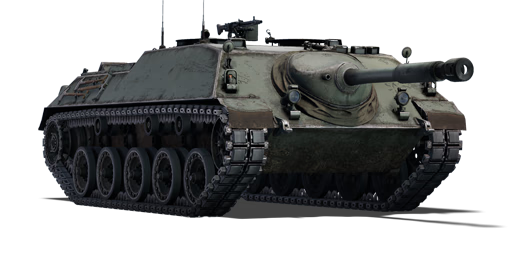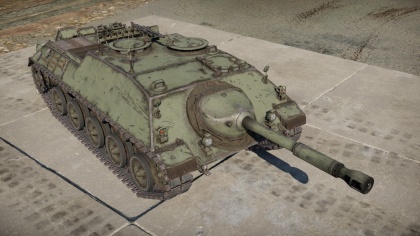JPz 4-5
Contents
Description
The Hanomag-Henschel JPz 4-5 or Kanonenjagdpanzer is a rank IV German tank destroyer
with a battle rating of 6.3 (AB/RB/SB). This tank was added during Update 1.53 "Firestorm". It takes the design of the older Jagdpanzer IV and the chassis of the Ru 251 by having a lower profile in order to perform ambush duties against enemy tanks.
General info
Survivability and armour
The 50 mm thick frontal plate protects the crew against heavy machine gun fire and some small calliber cannons. Care must be taken in regards to strafing planes since .50 cal rounds can penetrate your roof armour with ease, usually resulting in 1-2 crew loss and potential engine fire.
Armour type:
- Rolled homogeneous armour
- Cast homogeneous armour (Gun mantlet)
| Armour | Front (Slope angle) | Sides (Slope angle) | Rear (Slope angle) | Roof |
|---|---|---|---|---|
| Hull Superstructure | 50 mm (50°) Front glacis 50 mm (55°) Lower glacis |
30 mm (35°) Top 30 mm Bottom |
30 mm (45°) Top 30 mm (40°) Bottom |
10 mm General area 20 mm Front part |
| Armour | Sides | Roof | ||
| Cupola | 10 mm | 10 mm |
Notes:
- Suspension wheels are 15 mm thick while tracks are 20 mm thick.
Mobility
| Game Mode | Max Speed (km/h) | Weight (tons) | Engine power (horsepower) | Power-to-weight ratio (hp/ton) | |||
|---|---|---|---|---|---|---|---|
| Forward | Reverse | Stock | Upgraded | Stock | Upgraded | ||
| Arcade | 77 | 77 | 25.5 | 710 | 954 | 27.84 | 37.41 |
| Realistic | 71 | 71 | 442 | 500 | 17.33 | 19.61 | |
The JPz 4-5 is quite mobile for a tank destroyer due to its light weight, which means it can get into a sniping position early in the game and quickly change locations if spotted. The reverse speed is very good, cruising at -30/-20 km/h (AB/RB) in a heartbeat, with the possibility to reach a maximum speed of -51/-43 km/h.
Armaments
Main armament
Equipped with Rheinmetall BK 90/L40 90 mm anti-tank gun. When the Soviets began deploying their T-64 and T-72 main battle tanks, the 90 mm gun was not capable of engaging them in long-range combat and at that point the Kanonenjagdpanzer 90 mm became obsolete, despite the claims from manufacturers that the JPz 4-5 could be rearmed with a 105 mm gun.
| 155 mm T7 | |||||
|---|---|---|---|---|---|
| Capacity | Vertical guidance |
Horizontal guidance |
Stabilizer | ||
| 51 | -8°/+15° | ±15° | N/A | ||
| Turret rotation speed (°/s) | |||||
| Mode | Stock | Upgraded | Prior + Full crew | Prior + Expert qualif. | Prior + Ace qualif. |
| Arcade | __.__ | __.__ | __.__ | __.__ | __.__ |
| Realistic | 4.8 | __.__ | __.__ | __.__ | __.__ |
| Reloading rate (seconds) | |||||
| Stock | Prior + Full crew | Prior + Expert qualif. | Prior + Ace qualif. | ||
| 7.2 | __.__ | __.__ | __.__ | ||
Ammunition
| Penetration statistics | |||||||
|---|---|---|---|---|---|---|---|
| Ammunition | Type of warhead |
Penetration in mm @ 0° Angle of Attack | |||||
| 10m | 100m | 500m | 1000m | 1500m | 2000m | ||
| M332 shot | APCR | 271 | 270 | 245 | 217 | 192 | 170 |
| M431 shell | HEATFS | 320 | 320 | 320 | 320 | 320 | 320 |
| M71 shell | HE | 13 | 13 | 13 | 13 | 13 | 13 |
| DM502 | HESH | 102 | 102 | 102 | 102 | 102 | 102 |
| Shell details | ||||||||||
|---|---|---|---|---|---|---|---|---|---|---|
| Ammunition | Type of warhead |
Velocity in m/s |
Projectile Mass in kg |
Fuse delay
in m: |
Fuse sensitivity
in mm: |
Explosive Mass in g (TNT equivalent): |
Normalization At 30° from horizontal: |
Ricochet: | ||
| 0% | 50% | 100% | ||||||||
| M332 shot | APCR | 1178 | 5.6 | N/A | N/A | N/A | +1.5° | 66° | 70° | 72° |
| M431 shell | HEATFS | 1,216 | 5.8 | 0.0 | 0.1 | 712.64 | +0° | 65° | 72° | 75° |
| M71 shell | HE | 823 | 11.0 | 0.1 | 0.5 | 925 | +0° | 79° | 80° | 81° |
| DM502 | HESH | 853 | 11.0 | 0.4 | 0.1 | 3,050 | +0° | 73° | 77° | 80° |
Machine guns
Usage in battles
The Jagdpanzer 4-5 is a very hard tank destroyer to master. It shines with excellent mobility and a rapid rate of fire but has some serious downsides as well. Such as the lack of a turret and it suffers from a really poor armour at Rank V, which leaves almost no space for mistakes. Know the map and flank your enemies making use your excellent mobility. Find a flanking position that allows getting quickly in cover with the use of the superb reverse speed of 70 km/h. Now it is time to scan the environment for enemies and take them out one by one. In case of getting spotted get in cover as fast as possible to reposition or wait until your enemy makes a mistake.
The best way of an engaging the enemy in this tank is to "scoot and shoot" since this vehicle is literally a glass cannon, concealment and cover are the JPz 4-5's best friend. There really isn't just one most dangerous enemy for this tank as its weak armour makes it vulnerable to all kinds of vehicles.
Pros and cons
Pros:
- Low profile, meaning enemy will have a hard time searching for your silhouette
- Fast firing gun
- Fast speed and mobility
- HEAT-FS can reliably penetrate Russian sloped armour
Cons:
- Glass canon, your armour is bad from all around
- Small calibre for a fifth rank tank destroyer
- Stock shell is APCR, meaning its harder than usual to research modifiations
History
Development
In the Cold War, the Bundeswehr, West Germany's defence forces, envisaged a tactical doctrine of a mobile defence system. This system would require the use of traditional tank destroyers as they were during World War II. Their role would be to provide infantry support against an armoured target with their powerful guns.
Hanomag and Henschel of Germany, along with MOWAG from Switzerland, developed a prototype of a vehicle able to hold the 90 mm gun commonly used in the M47 Patton. The first prototype was made in 1960 and these vehicles were produced until 1967. The vehicle was known as the Kanonenjagdpanzer 4-5, or shortened to Kanonenjagdpanzer. 770 were built for the Bundeswehr, West Germany's defence forces, and 80 of these produced models were also given to Belgium in April 1975.
Design
The Kanonenjagdpanzer takes a huge design similarity to the Jagdpanzer IV design, with a very low profile to present itself less of a target. However, the armour is only 50 mm thick sloping, which itself is the very thing for the era the vehicle was introduced. The vehicle carries a crew of four people to perform its functions. The 90 mm gun is fixed on a casemate structure, thus it has limited traverse like traditional tank destroyer designs. Inside the vehicle, there are provisions for holding 51 rounds for the main gun, plus about 4,000 machine gun rounds for the coaxial. Aside from that, additional protection the vehicle protects is NBC protection to combat against weapons of mass destruction.
Usage
The Kanonenjagdpanzer saw use in tank destroyer companies within mechanized and mountain infantry brigades of the Bundeswehr. However, the newer Soviet second-generation main battle tanks, the T-64 and the T-72, were more than capable of taking on the 90 mm gun the Kanonenjagdpanzer is equipped with, and so the Kanonenjagdpanzer was declared obsolete. The producers tried to lengthen its service life by claiming that the 105 mm L7 gun can be adapted into the design, but this proved fruitless.
The Kanonenjagdpanzer, due to its obsolete status, saw more usage in specialized roles. Between 1983 and 1985, about 163 Kanonenjagdpanzer were converted into Raketenjagdpanzer Jaguar 2 (not to be confused with the Raketenjagdpanzer 2), a vehicle with a TOW anti-tank guided missile on the roof. Others were converted to artillery observation vehicle named Beobachtungspanzer and served in mortar units to direct fire.
The Kanonenjagdpanzer design stayed with the Bundeswehr up until 1990, when they were formally retired from service.
In-game description
The project to develop the self-propelled antitank mount was begun in the mid-1950s by specialists from the companies Hanomag (Hannoversche Maschinenbau AG) and Henschel (Rheinstahl Henschel AG). The base selected for the new vehicle was the Schützenpanzer Lang HS.30 armored transporter. The first prototype of the SPG with the designation Kanonenjagdpanzer 1-3 was assembled in 1959. The tests revealed significant flaws in the vehicle. As a result, more work was done to refine it. The decision was made to arm the new SPG with a 90mm antitank cannon similar to the one installed on the American M47 Patton II.
By 1961 each development company had built its own experimental model. Both models were presented for testing. After comparative testing, as well as the merger of the two companies, the decision was made to combine the efforts of the specialists from both companies in order to build a single experimental model. Work on the creation and testing of the new model continued until 1965.
After all testing was complete in 1966 the new vehicle was accepted as part of the arsenal under the designation JPz 4-5. The SPG was built serially from 1966 to 1967. During its production the companies Hanomag and Henschel each built 385 vehicles.
Media
Skin and Camouflages for the JPz 4-5 in Warthunder Live.
Videos
See also
Links to the articles on the War Thunder Wiki that you think will be useful for the reader, for example:
- reference to the series of the vehicles;
- links to approximate analogues of other nations and research trees.
External links
| Germany tank destroyers | |
|---|---|
| Pz. I Derivatives | Panzerjäger I |
| Pz. II Derivatives | 15cm sIG 33 B Sfl |
| Pz. 38(t) Derivatives | Marder III · Marder III H · Jagdpanzer 38(t) |
| Pz. III Derivatives | StuG III A · StuG III F · StuG III G · StuH 42 G |
| Pz. IV Derivatives | Jagdpanzer IV · Panzer IV/70(A) · Panzer IV/70(V) · Dicker Max · Nashorn · Brummbär · VFW |
| Pz. V Derivatives | Jagdpanther G1 · Bfw. Jagdpanther G1 |
| Pz. VI Derivatives | Sturer Emil · Elefant · Ferdinand · 38 cm Sturmmörser · Jagdtiger |
| Wheeled/Half-track | 8,8 cm Flak 37 Sfl. · Sd.Kfz.251/9 · Sd.Kfz.251/10 · Sd.Kfz.251/22 · Sd.Kfz.234/3 · Sd.Kfz.234/4 · 15 cm Pz.W.42 |
| ATGM Carrier | RakJPz 2 · RakJPz 2 (HOT) · Wiesel 1A2 |
| Other | Waffenträger · M109G · JPz 4-5 · Raketenautomat · VT1-2 |





